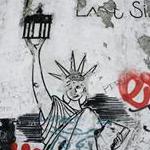 What if the savings in your bank account lost 55 percent of its value over the last 12 months? Would you be somewhat peeved? Would you transfer some of your savings to another currency?
What if the savings in your bank account lost 55 percent of its value over the last 12 months? Would you be somewhat peeved? Would you transfer some of your savings to another currency?
That was the favored approach in Argentina – where the official inflation rate’s 55 percent. But no more. On September 2, President Mauricio Macri resorted to capital controls to preserve the central bank’s foreign exchange reserves and prop up the peso. What gives?
Just fifteen months ago Macri secured the biggest bailout in the International Monetary Fund’s history. Now Argentina’s delaying payment to its creditors and is rapidly approaching what will be its third sovereign default this century. On top of that, Macri’s Peronist rival Alberto Fernández will likely take his job come election day in October.
Alas, for Macri and his countrymen, a painful lesson is being exacted. You can’t solve a debt problem with more debt. Eventually the currency buckles and you’re left with two poisons to pick from: inflation or default. With Macri’s latest capital controls scheme he’s choosing to take swigs of both. Continue reading







